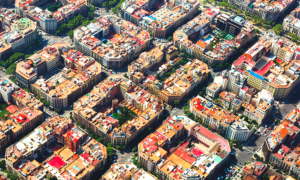According to 1978 Constitution, territorial governance in Spain is structured across three levels: autonomous communities (17), provinces (50) and municipalities (8.122), two of which – Madrid and Barcelona – enjoy a special system with exclusive competencies. The economic relationship between the Central State and local economies is regulated by the principles of financial autonomy and financial self-sufficiency; meaning that municipalities, provinces and islands have broad leeway on how to spend money and that they should be guaranteed with adequate resources to fulfill their competences. In this respect, municipal councils in Spain contribute by 69,1% of annual public spending.
Administrative structure
The structure of Barcelona City Council is defined by the Municipal Charter and organised in a political and executive level.
The first is composed by councilors with decision-making responsibilities in matter of planning, scheduling and monitoring; and includes the Mayor, the Municipal Government Commission and the Municipal Council. The second works under the Municipal Manager’s lead and is responsible for implementing the initiatives approved by the Municipal Government and the Municipal Council.
The latter body’s composition reflects the proportion of votes obtained by each party at municipal elections, held every 4 years with next round being scheduled for 2019.
The City Council’s executive body is the Municipal Government Commission, which includes the Mayor, nine councilors appointed by her/him as chair, and four Deputy Mayors. It defines the main tenets of municipal government actions, constituting the place where final approval is given to budget, bylaws and the Municipal Action Plan, after they have been ratified by the Full Council. The four Deputy Mayors are tasked to oversee as many policy areas, notably 1) Economy, Employment, Digital City and International Relations; 2) Social Rights; 3) Citizen Rights, Culture, Participation and Transparency; 4) Ecology, Urban Planning and Mobility; to each of which corresponds a team of councilors and commissioners with more targeted responsibilities. The only commissioner reporting directly to the Mayor’s Office is the one in charge with Security and Safety.
Moreover, in order to both foster a decentralised administration and greater citizens representation at the sub-local level, the city is further divided into ten districts; each of which is represented by its own District Council, along with the District Councilor and the Presiding District Councilor. According to the Municipal Charter, at least 15% of the annual municipal budget has to be managed and spent by the District Council.
In the light of its special regime, Barcelona enjoys a broad array of exclusive competencies, as defined by the Municipal Charter. Based on this document, following is a list of the municipal competencies that the city is mandated to administer locally and of those shared with other supra-local levels of governance.
Exclusive competencies
Urban planning
- Planning and maintenance of public spaces
- Issuing of licenses
- Building controls
- Urban management
Water Management Cycle
- Rainwater management
- Sewerage network
- Management of alternative water resources in the municipal area
Energy
- Energetic planning and management within the municipal area
Mobility
- Planning of urban mobility within the municipal boundaries
- Monitoring, sanctioning and drafting of road safety plans
- Supplies distribution
- Parking areas
Environment and Biodiversity
- Planning related to green areas and biodiversity issues
- Management of green areas
- Irrigation
Civil Protection
- Municipal civil protection plans and harmonisation with regional plans
Social Services
- Social care services
- Social attention services for vulnerable people
- Emergency and prevention
Sport
- Plan and build sport facilities within the municipal boundaries.
- Inform the regional director plan for sport facilities
- Manage sport-related partnerships with other administrative entities.
Economic public initiatives
Local police and security
Fire suppression
Sanitary police
Shared competencies
Urban planning
- Territorial planning – City Council, Metropolitan Area (AMB), Generalitat
- Urban planning – City Council, Generalitat
Housing
- Housing policies – City Council, Generalitat (through the Housing Consortium)
- Access to Social Housing – City Council, Generalitat (through the Housing Consortium)
Water Supply
- Water Supply (municipal scale) – Private utility provider, Aigues de Barcelona
- Water Inspections – City Council, Municipal Area (AMB) and Generalitat
- Contingency measures – City Council, Municipal Area (AMB) and Generalitat
Wastewater
- Wastewater treatment and sanitation – City Council and Catalan Water Agency
Energy
- Municipal scale – Private utility provider, ENDESA
Public Health
- Planning, management and evaluation of healthcare centers – City Council and Generalitat, through the Barcelona Health Consortium
- Surveillance on environmental quality – City Council and Generalitat, through the Catalan Public Health Agency
- Health inspections – City Council and Generalitat, through the Catalan Public Health Agency
- Information on health issues – City Council and Generalitat, through the Catalan Public Health Agency
Solid Waste
- Collection – City Council
- Treatment and Recycling – Barcelona Metropolitan Agency
Mobility
- Planning of public transport services and infrastructure – City Council, Metropolitan Area (AMB) and Generalitat, though the Urban Public Transport Consortium
- Harmonization of charging fees – City Council, Metropolitan Area (AMB) and Generalitat, through the Urban Public Transport Consortium
Education
- Planning and territorial distribution of education facilities – City Council and Generalitat through the Education Consortium
- Creation, renovation and management of primary and secondary educational facilities – and Generalitat through the Education Consortium
Sanitary inspections, Food and Water inspection, Environmental control
- City Council and Generalitat through Barcelona Public Health Agency – an autonomous body created by the Barcelona Health Consortium
Public Health
- Management and evaluation of the services through the Barcelona Public Health Agency: an autonomous body created by the Barcelona Health Consortium – are shared by the City Council and the Generalitat with 3/5 and 2/5 of the representatives respectively
Culture
Creation and management of Museums, Libraries and Archives, Theatres and Auditoriums – City Council and the Generalitat,
Youth recreational activities and facilities
- Management of youth and coordination facilities – City Council and Generalitat
Women public facilities
- Management of women public facilities – City Council and Generalitat


